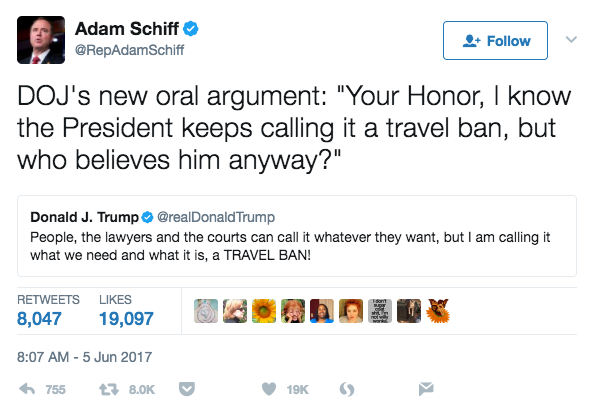Why Trump's Plan to Live-Tweet The Comey Hearing Could Backfire
By:
Adding another layer of intrigue to what's already being described as "Washington's Super Bowl," Washington Post politics writer Robert Costa reported that President Donald Trump will respond live in real time via Twitter to the Senate testimony of recently-fired former FBI Director James Comey.
Because Trump is already scheduled to speak at a religious conference around the same time, it's not clear if he'll actually have time to tweet. But if he does, Trump could put himself in a legally precarious position by giving a potential grand jury or impeachment panel material to use against him.
In anticipation of his testimony, the Intelligence Committee's Chairman, North Carolina Republican Richard Burr, said there would be no limits on what Comey could testify about, including the details of his firing, whether or not Trump pressured Comey into dropping his investigation, and the memos Comey wrote after his various meetings with the president.
If Trump tweets in response to Comey's testimony, he will be giving current and future investigators admissible material. According to the American Bar Association's publication Litigation News, Electronically Stored Information (ESI) is treated the same way in court as any other evidence.
"For admission in court, a party must show that the ESI is relevant; authenticate it; address issues of unfair prejudice and probative value; address hearsay ... and demonstrate that the ESI conforms to the best evidence rule," the ABA writes. Essentially, the tweet would only have to be shown to be relevant to the case at hand, have come from Trump himself, and not be false.
For example, if Trump tweets information that confirms an allegation of illegal or unethical activity, it could easily show up in grand jury testimony against a Trump associate, or be used as evidence by the House Judiciary Committee when writing potential articles of impeachment.
Trump's lawyers have had to deal with the president's public comments in other cases, as well.
Both the original measure and the revised version of Trump's executive order barring travel from a list of several Muslim majority countries were blocked by courts, which found the ban constitutional on the grounds that it was religiously based.
Administration lawyers had been arguing that the executive orders weren't a travel ban based on religious affiliation, but rather a homeland security measure against countries that represent a terrorist threat to the United States.
However, Trump and his surrogates repeatedly spoke about the need to ban Muslims from entering the country while on the campaign trail.
As a result, administration lawyers have had to argue against the president's intent ...
 Twitter.com - twitter.com
Twitter.com - twitter.com
... and an upcoming Supreme Court appeal to get the ban re-instated might be hampered by a recent tweet storm in which he repeatedly refers to the executive order as a "travel ban."
